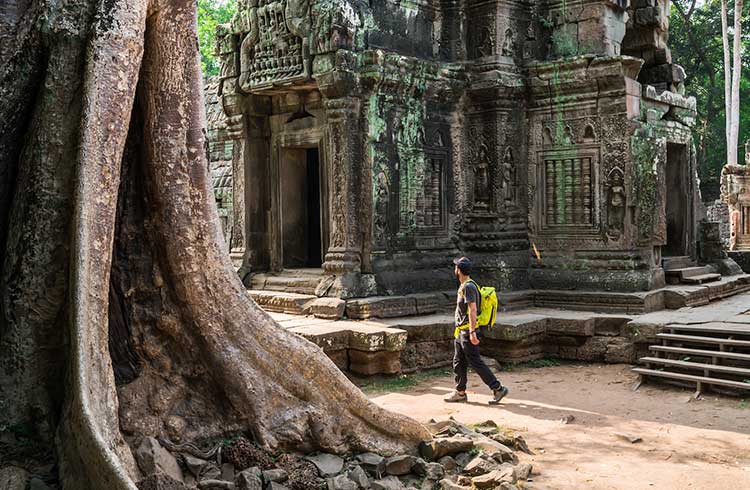Global coronavirus outbreak Cambodia Angkor temple complex now a ghost town

In the midst of the global coronovirus outbreak, Angkor Wat and surrounding temples in Cambodia, one of Asia's most popular tourist attractions, had fewer than half the number of people in February compared to last year. Cambodia plans to ban the sale of sugary drinks in schools to tackle the rise in non-communicable diseases.
The state's ticketing agency Angkor Enterprises said that around 119 000 people visited the house of UNESCO World Heritage Listed Angkor Wat last month, about 56 percent less than the same month in 2019. This move is also in line with the Partnership for Healthy Cities programme. City municipal governor Khuong Sreng said the authorities would implement a reduction in the consumption of sugary drinks at schools.

More than 300 million people are involved in the Partnership for Healthy Cities, which receives financial support from Bloomberg Philanthropies — a partner of the United Nations’ World Health Organisation — and Vital Strategies.
Angkor Wat is a Hindu, Buddhist temple complex in Cambodia and is the largest religious monument in the world. According to the Phnom Penh Post, Cambodia was among 70 cities worldwide committed to saving their residents’ lives by preventing non-communicable diseases, such as diabetes.
The Covid-19 outbreak was first detected in China, where the most infections and deaths have been reported. Chinese visitors in February plummeted by 94 percent, from nearly 119 000 people in February 2019 down to fewer than 7 200.
While China has supplied the largest number of visitors to Cambodia's temple complex in recent years.
Since the outbreak began, the nation's tourism businesses have struggled to keep their doors open, Chhay Sivlin, president of the Cambodia Association of Travel Agents, told dpa.
Cambodia Association of Many businesses have experienced a 70 to 80-percent loss in sales, Sivlin said, adding that the numbers continue to drop. Phnom Penh Municipal Education Department director Hem Sinareth said the Education Ministry had introduced plans to ban sugary food and drinks at educational institutions.
“Youth and Sports Ministry to curb the sale of prohibited food at educational institutions for months,” Sinareth said.
The industry's main challenge at the moment is the fact that there is "little-to-no business" from the "usual customers due to many preferring to stay home," she said.
With travel restrictions in place, tour operators and hotels are trying to boost domestic tour programmes and attract locals with low prices and attractive packages, according to Sivlin.
In May, the ministry announced that to improve health, educational institutions were prohibited from selling expired food, alcohol, tobacco, energy drinks, coffee, ice cream, chocolates, candy and chewing gum, as well as doughnuts and sweets.

In the midst of the global coronovirus outbreak, Angkor Wat and surrounding temples in Cambodia, one of Asia's most popular tourist attractions, had fewer than half the number of people in February compared to last year. Cambodia plans to ban the sale of sugary drinks in schools to tackle the rise in non-communicable diseases.
The state's ticketing agency Angkor Enterprises said that around 119 000 people visited the house of UNESCO World Heritage Listed Angkor Wat last month, about 56 percent less than the same month in 2019. This move is also in line with the Partnership for Healthy Cities programme. City municipal governor Khuong Sreng said the authorities would implement a reduction in the consumption of sugary drinks at schools.

More than 300 million people are involved in the Partnership for Healthy Cities, which receives financial support from Bloomberg Philanthropies — a partner of the United Nations’ World Health Organisation — and Vital Strategies.
Angkor Wat is a Hindu, Buddhist temple complex in Cambodia and is the largest religious monument in the world. According to the Phnom Penh Post, Cambodia was among 70 cities worldwide committed to saving their residents’ lives by preventing non-communicable diseases, such as diabetes.
The Covid-19 outbreak was first detected in China, where the most infections and deaths have been reported. Chinese visitors in February plummeted by 94 percent, from nearly 119 000 people in February 2019 down to fewer than 7 200.
While China has supplied the largest number of visitors to Cambodia's temple complex in recent years.
Since the outbreak began, the nation's tourism businesses have struggled to keep their doors open, Chhay Sivlin, president of the Cambodia Association of Travel Agents, told dpa.
Cambodia Association of Many businesses have experienced a 70 to 80-percent loss in sales, Sivlin said, adding that the numbers continue to drop. Phnom Penh Municipal Education Department director Hem Sinareth said the Education Ministry had introduced plans to ban sugary food and drinks at educational institutions.
“Youth and Sports Ministry to curb the sale of prohibited food at educational institutions for months,” Sinareth said.
The industry's main challenge at the moment is the fact that there is "little-to-no business" from the "usual customers due to many preferring to stay home," she said.
With travel restrictions in place, tour operators and hotels are trying to boost domestic tour programmes and attract locals with low prices and attractive packages, according to Sivlin.
In May, the ministry announced that to improve health, educational institutions were prohibited from selling expired food, alcohol, tobacco, energy drinks, coffee, ice cream, chocolates, candy and chewing gum, as well as doughnuts and sweets.




